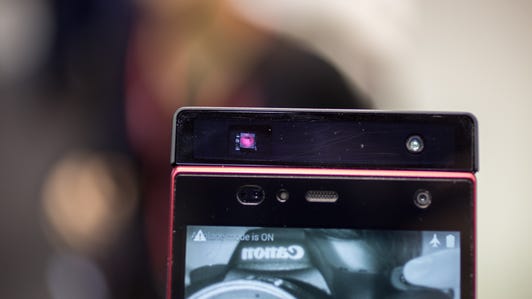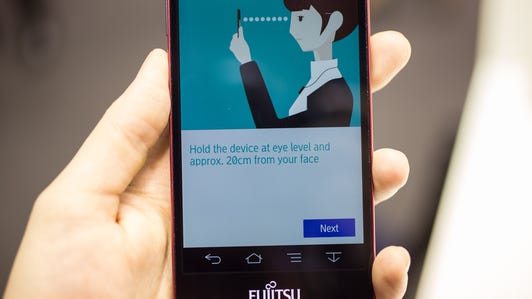
Andrew Hoyle/CNET
Scanning your fingerprints to unlock your smartphone is old news. It’s time to put your eyes to work!
At this year’s Mobile World Congress in Barcelona, Fujitsu has been showing off a concept phone that uses infrared lasers and cameras to scan your iris and unlock your phone. The first question in all of this is, of course, why?
Cast your eyes on Fujitsu’s iris-scanning phone concept (pictures)






Well, there are some good reasons. For starters, Fujitsu explains that the human iris is more complex than a fingerprint and is therefore a more secure method of locking a phone. It also means you don’t need to remember PIN codes, passwords or patterns, which are easy to forget, especially after you’ve had a drink or two.
Crucially though, fingerprint scanners can be confused if you have damp fingers or are wearing gloves. With iris scanning, you can whip your phone out on a chilly day and won’t need to expose your fingers to the cold air to access your phone. As a resident of London, I find this somewhat appealing.


Andrew Hoyle/CNET
Though it’s only a concept, I was impressed at how well it worked. You’ll need to register your iris on the phone first, which just requires you to position your eyes in the on-screen guide for 20 seconds, and then it’s all done. Fujitsu recommended I take my glasses off for the registration process, but I found it was able to recognise my iris afterwards extremely easily, with glasses on or off.
Once registered, you’ll simply have to hold the phone 20-centimetres from your face each time you wake it from standby. It recognised my eyes in an instant — to the extent, in fact, that it was difficult for CNET video producer Sally Neiman to film properly, as it happened too quickly to really see what was going on. If you’re in a hurry and trying to quickly grab some info, the scanner certainly won’t slow you down.


Andrew Hoyle/CNET
Fujitsu showed off the technology strapped on top of a generic Android phone, but it said it will be squashing the scanner inside phones that should go on sale later this year. Fujitsu wasn’t willing to provide any details on its upcoming phones, or indeed exactly when we’ll see them and how much of a premium we’ll have to pay for this new technology, but keep your eyes on CNET for more information in the coming months.



